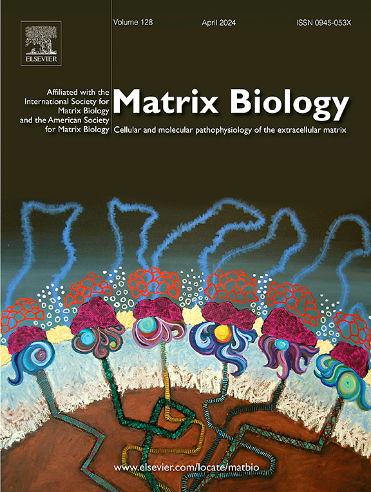Integrins and integrin-driven secretory pathways as multi-dimensional regulators of tumor-associated macrophage recruitment and reprogramming in tumor microenvironment
IF 4.8
1区 生物学
Q1 BIOCHEMISTRY & MOLECULAR BIOLOGY
引用次数: 0
Abstract
Integrins, a group of transmembrane receptors, play a crucial role in mediating the interactions between cells and extracellular matrix (ECM) proteins. The intracellular signaling initiated by these cell-matrix interactions in leukocytes mediates many essential cellular processes such as survival, migration, metabolism, and other immunological functions. Macrophages, as phagocytes, participate in both proinflammatory and anti-inflammatory processes, including progression. Numerous reports have shown that the integrin-regulated secretome, comprising cytokines, chemokines, growth factors, proteases, and other bioactive molecules, is a crucial modulator of macrophage functions in tumors, significantly influencing macrophage programming and reprogramming within the tumor microenvironment (TME) in addition to driving their step-by-step entry process into tumor tissue spaces. Importantly, studies have demonstrated a pivotal role for integrin receptor-mediated secretome and associated signaling pathways in functional reprogramming from anti-tumorigenic to pro-tumorigenic phenotype in tumor-associated macrophages (TAMs). In this comprehensive review, we have provided an in-depth analysis of the latest findings of various key pathways, mediators, and signaling cascades associated with integrin-driven polarization of macrophages in tumors. This manuscript will provide an updated understanding of the modulation of inflammatory monocytes/ macrophages and TAMs by integrin-driven secretory pathways in various functions such as migration, differentiation, and their role in tumor progression, angiogenesis, and metastasis.
整合素和整合素驱动的分泌通路作为肿瘤微环境中肿瘤相关巨噬细胞募集和重编程的多维调控因子。
整合素是一组跨膜受体,在细胞与细胞外基质(ECM)蛋白之间的相互作用中起着至关重要的作用。由这些细胞-基质相互作用在白细胞中启动的细胞内信号传导介导了许多基本的细胞过程,如生存、迁移、代谢和其他免疫功能。巨噬细胞,作为吞噬细胞,参与促炎和抗炎过程,包括进展。大量报道表明,整合素调节的分泌组,包括细胞因子、趋化因子、生长因子、蛋白酶和其他生物活性分子,是肿瘤中巨噬细胞功能的重要调节剂,除了推动巨噬细胞逐步进入肿瘤组织空间外,还显著影响肿瘤微环境(TME)内巨噬细胞的编程和重编程。重要的是,研究已经证明整合素受体介导的分泌组和相关信号通路在肿瘤相关巨噬细胞(tam)从抗致瘤表型到促致瘤表型的功能重编程中起关键作用。在这篇全面的综述中,我们深入分析了与肿瘤中巨噬细胞整合素驱动极化相关的各种关键途径、介质和信号级联的最新发现。本文将对整合素驱动的分泌通路在各种功能(如迁移、分化)中对炎性单核/巨噬细胞和tam的调节以及它们在肿瘤进展、血管生成和转移中的作用提供最新的理解。
本文章由计算机程序翻译,如有差异,请以英文原文为准。
求助全文
约1分钟内获得全文
求助全文
来源期刊

Matrix Biology
生物-生化与分子生物学
CiteScore
11.40
自引率
4.30%
发文量
77
审稿时长
45 days
期刊介绍:
Matrix Biology (established in 1980 as Collagen and Related Research) is a cutting-edge journal that is devoted to publishing the latest results in matrix biology research. We welcome articles that reside at the nexus of understanding the cellular and molecular pathophysiology of the extracellular matrix. Matrix Biology focusses on solving elusive questions, opening new avenues of thought and discovery, and challenging longstanding biological paradigms.
 求助内容:
求助内容: 应助结果提醒方式:
应助结果提醒方式:


